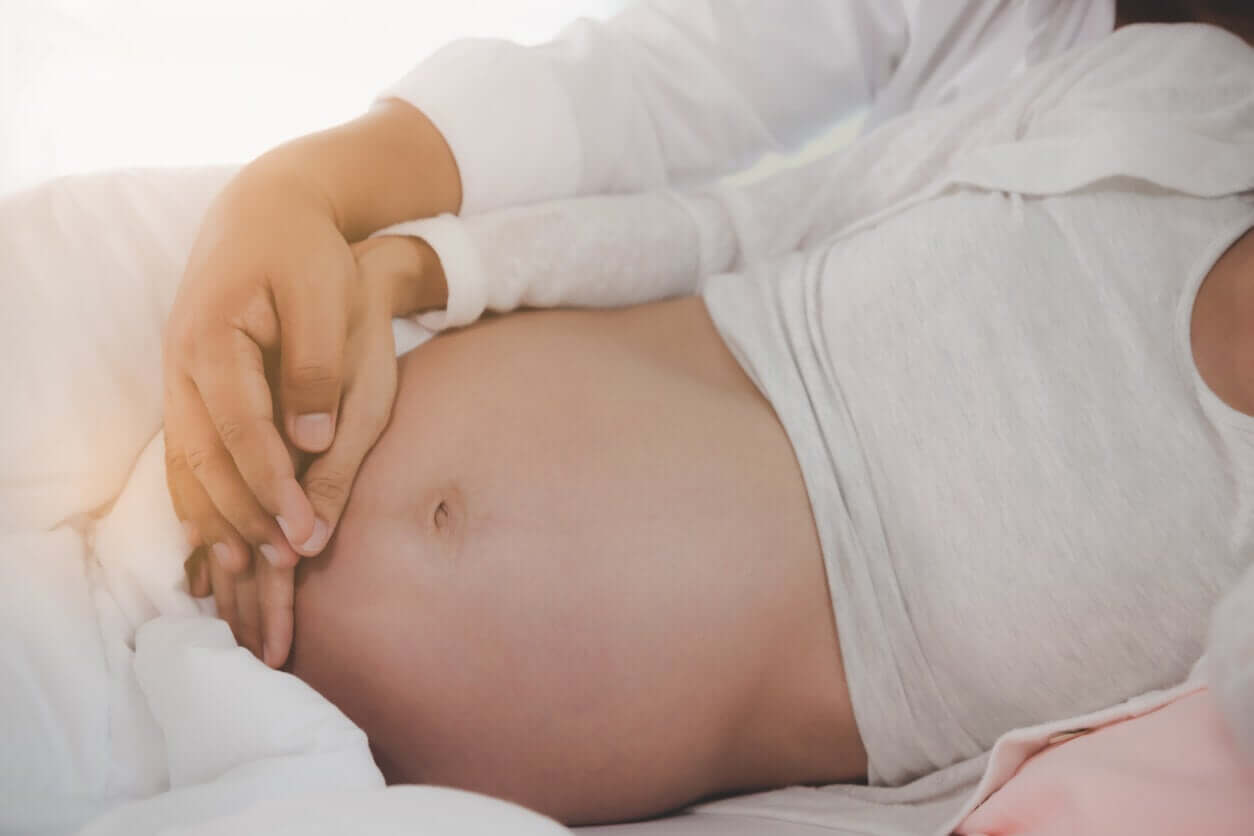Your Baby's First Kicks: Everything You Need to Know

There’s nothing more beautiful in pregnancy than feeling your baby’s first kicks. These movements promote that perfect connection that’s established between the mother and her child, which allows them to communicate beyond words.
Apart from being filled with emotion by feeling her baby move, a pregnant woman can make sure of her baby’s well-being. That’s because a baby that moves frequently is a baby that’s healthy, growing, and developing. But when do you begin to feel a baby’s first kicks and how often should they be felt? We’ll tell you everything you need to know below.
In what week can we notice the baby’s first kicks?
The first movements of the embryo appear around the 8th week of pregnancy. In this stage, the baby swims, makes involuntary movements, and moves freely within the amniotic fluid. However, the mother still doesn’t perceive them because her child is very small.
In general, the baby’s first kicks begin to be felt around the 20th week of gestation. By then, the fetus has already acquired a considerable size and is able to forcefully push the walls of its mother’s abdomen.
New mothers may notice these movements a little later than those who’ve already had other children. Likewise, some factors such as obesity, the amount of amniotic fluid present, and the location of the placenta can also influence their perception.

The intensity of fetal movements
At first, fetal movements usually feel like a soft bubbling of fluttering inside the belly, but then they become more intense and can even cause discomfort.
The maximum intensity of a baby’s movements occurs around the 28th week of pregnancy. From then on, it tends to decrease, as the space within the uterus is reduced. In general, closer to the due date, these kicks usually occur at precise times of the day and with considerable force.
Regardless of the frequency or intensity, it’s important to note that fetal movements must always be present until the end of gestation.
Each mother may perceive them in a particular way, but she must feel them every day. This is one of the aspects that’s evaluated in prenatal medical controls to determine the health and well-being of the child.
How many times a day should I feel the baby’s kicks?
Another doubt that invades pregnant women is how often they should feel the baby’s kicks, and this depends on the trimester of pregnancy.
As of week 20, the kicks are present but are rarely felt, so their daily frequency can’t be assessed. As the weeks go by, the movements become more frequent, and that’s when the mother can determine the pattern of daily movements of her baby. Ideally, this should be recorded in a notebook in order to know the child’s daily rhythm.
By the third trimester, it’s usual for the baby to have at least 10 movements a day. If you feel less than this or you notice a marked decrease in the usual rhythm, you should consult with a specialist as soon as possible.
At what time of the day are these movements most frequent?
There are certain factors that are related to fetal movements, such as when the mother is eating and the type of food she eats. Sweet foods increase blood glucose and this causes an increase in the baby’s activity.
In addition to this factor, the fetus perceives the emotions of its mother through the hormones that travel through the blood of both of them. Therefore, the baby “experiences” these emotions as well.
If the mother is stressed or has an argument during the day, her body releases cortisol and adrenaline. Both hormones get into your child’s circulation and lead to increased kicking. In fact, several studies affirm that this can have other consequences in the future in the baby’s body.
Finally, another important conditioning factor for fetal movements is the state of sleep and wakefulness. In general, the baby is usually most active during the first hours of the day (between 9 a.m. and 2 p.m.) and at night (after 7 p.m.). The rest of the time, it sleeps and replenishes its energy. In general, their naps are 40 to 60 minutes long, and there are no kicks or movements during them.
Many mothers report that their baby becomes more energetic after they lie down. In reality, what happens is that their movements are more noticeable when you rest than when you’re active. For this reason, nighttime becomes the best moment to start “talking” without interruptions.

The benefits of kicking the baby inside the womb
Fetal movements within the uterus are beneficial for neuromuscular development in general. They allow the baby to strengthen the trunk, the limbs, swallowing, and also the muscles involved in breathing. In addition, these exercises favor coordination between the brain and the other organs.
It’s worth bearing in mind that more than counting the baby’s daily kicks, it’s fundamental that you pay attention to the rhythm and pattern of movements. This is how you can assess what type of activity the baby has habitually and begin to become familiar with its sleep and wake rhythm.
In the event that you notice that this pattern of activity decreases or if more than 24 hours have passed without feeling the baby’s movements, the best thing to do is go to the doctor to confirm that everything is going well with the pregnancy.
There’s nothing more beautiful in pregnancy than feeling your baby’s first kicks. These movements promote that perfect connection that’s established between the mother and her child, which allows them to communicate beyond words.
Apart from being filled with emotion by feeling her baby move, a pregnant woman can make sure of her baby’s well-being. That’s because a baby that moves frequently is a baby that’s healthy, growing, and developing. But when do you begin to feel a baby’s first kicks and how often should they be felt? We’ll tell you everything you need to know below.
In what week can we notice the baby’s first kicks?
The first movements of the embryo appear around the 8th week of pregnancy. In this stage, the baby swims, makes involuntary movements, and moves freely within the amniotic fluid. However, the mother still doesn’t perceive them because her child is very small.
In general, the baby’s first kicks begin to be felt around the 20th week of gestation. By then, the fetus has already acquired a considerable size and is able to forcefully push the walls of its mother’s abdomen.
New mothers may notice these movements a little later than those who’ve already had other children. Likewise, some factors such as obesity, the amount of amniotic fluid present, and the location of the placenta can also influence their perception.

The intensity of fetal movements
At first, fetal movements usually feel like a soft bubbling of fluttering inside the belly, but then they become more intense and can even cause discomfort.
The maximum intensity of a baby’s movements occurs around the 28th week of pregnancy. From then on, it tends to decrease, as the space within the uterus is reduced. In general, closer to the due date, these kicks usually occur at precise times of the day and with considerable force.
Regardless of the frequency or intensity, it’s important to note that fetal movements must always be present until the end of gestation.
Each mother may perceive them in a particular way, but she must feel them every day. This is one of the aspects that’s evaluated in prenatal medical controls to determine the health and well-being of the child.
How many times a day should I feel the baby’s kicks?
Another doubt that invades pregnant women is how often they should feel the baby’s kicks, and this depends on the trimester of pregnancy.
As of week 20, the kicks are present but are rarely felt, so their daily frequency can’t be assessed. As the weeks go by, the movements become more frequent, and that’s when the mother can determine the pattern of daily movements of her baby. Ideally, this should be recorded in a notebook in order to know the child’s daily rhythm.
By the third trimester, it’s usual for the baby to have at least 10 movements a day. If you feel less than this or you notice a marked decrease in the usual rhythm, you should consult with a specialist as soon as possible.
At what time of the day are these movements most frequent?
There are certain factors that are related to fetal movements, such as when the mother is eating and the type of food she eats. Sweet foods increase blood glucose and this causes an increase in the baby’s activity.
In addition to this factor, the fetus perceives the emotions of its mother through the hormones that travel through the blood of both of them. Therefore, the baby “experiences” these emotions as well.
If the mother is stressed or has an argument during the day, her body releases cortisol and adrenaline. Both hormones get into your child’s circulation and lead to increased kicking. In fact, several studies affirm that this can have other consequences in the future in the baby’s body.
Finally, another important conditioning factor for fetal movements is the state of sleep and wakefulness. In general, the baby is usually most active during the first hours of the day (between 9 a.m. and 2 p.m.) and at night (after 7 p.m.). The rest of the time, it sleeps and replenishes its energy. In general, their naps are 40 to 60 minutes long, and there are no kicks or movements during them.
Many mothers report that their baby becomes more energetic after they lie down. In reality, what happens is that their movements are more noticeable when you rest than when you’re active. For this reason, nighttime becomes the best moment to start “talking” without interruptions.

The benefits of kicking the baby inside the womb
Fetal movements within the uterus are beneficial for neuromuscular development in general. They allow the baby to strengthen the trunk, the limbs, swallowing, and also the muscles involved in breathing. In addition, these exercises favor coordination between the brain and the other organs.
It’s worth bearing in mind that more than counting the baby’s daily kicks, it’s fundamental that you pay attention to the rhythm and pattern of movements. This is how you can assess what type of activity the baby has habitually and begin to become familiar with its sleep and wake rhythm.
In the event that you notice that this pattern of activity decreases or if more than 24 hours have passed without feeling the baby’s movements, the best thing to do is go to the doctor to confirm that everything is going well with the pregnancy.
All cited sources were thoroughly reviewed by our team to ensure their quality, reliability, currency, and validity. The bibliography of this article was considered reliable and of academic or scientific accuracy.
- American pregnancy association. (2021). Contando los movimientos de su bebé. EEUU. Recuperado de: https://americanpregnancy.org/es/healthy-pregnancy/while-pregnant/counting-baby-kicks-71051/
- Cabanyes, J. (2014). El comportamiento fetal: una ventana al neurodesarrollo y al diagnóstico temprano. Revista Pediatría Atencion Primaria vol.16 no.63 Madrid jul./sep. 2014.
- Northwestern Memorial Hospital (2018). Conteo de Movimientos Fetales. Recuperado de: file:///C:/Users/Leidy/Downloads/northwestern-medicine-conteo-de-movimientos-fetales-fetal-movement-counting%20(2).pdf
- Thomas, L. (2018). Movimientos fetales en el embarazo. Recuperado de: https://www.news-medical.net/health/Fetal-Movements-in-Pregnancy-(Spanish).aspx
This text is provided for informational purposes only and does not replace consultation with a professional. If in doubt, consult your specialist.








